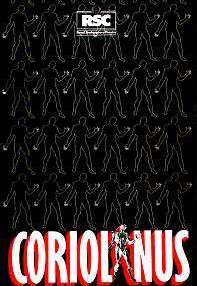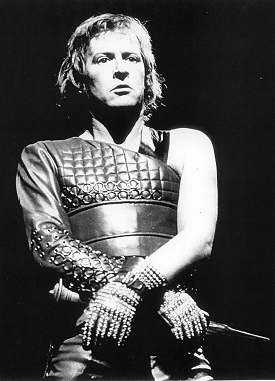

 |
 |
|
Terry Hands' production of Coriolanus at Stratford is staggeringly good. Played on a dark, cavernous stage over which two huge ribbed doors swing on hinges, it combines the imagistic power of Continental theatre with a very English respect for actors. True, first night nerves caused some odd verbal slips but Hands' increasingly stylised approach to staging pays rich dividends. The paradox of the production is that Alan Howard, one of our most likable actors, plays Coriolanus, Shakespeare's least-likable hero. But not since Olivier has anyone played the part with such complete understanding of his mental processes. From the opening scenes it is clear that in battle this man is a kind of god. And Hands emphasises the fact by, literally, elevating him. At Corioli he straddles the gap between Farrah's two huge doors like some avenging angel of death; and, as conquering hero, he is raised by the soldiers on staves like a secular idol. Howard's interpretation thereafter is based on the impossibility of coming down to earth. Triumphant in war, he cannot ingratiate in peace. In the senate he sullenly squats in his military jerkin like a hawk surrounded by doves. Suing for votes in the marketplace he asks the plebs for their "voices" in a mocking sardonic singsong. And, when banished, he greets Aufidius at Antium with the bright-eyed relish of a schoolboy meeting an erstwhile chum. Howard gives us not an arrogant patrician but a professional fighter with equal contempt for humbug politicians and private emotion. |
 |
What is particularly good about the production is the way emblematic imagery reinforces psychological points: thus Howard downstage reacts emotionally to the appearance of wife, mother and child outside Rome even though they enter directly behind him. And even though some of the detailed political arguments about the corn go for very little and some of the performances are a trifle strained (Graham Crowden's capering, wild-eyed Menenius hardly seems like an apostle of moderation) the staging has the exciting simplicity of the TNP under Jean Vilar.
Spectacle is created with a very small cast (only seven citizens and six senators). But there are individually striking performances by Maxine Audley, caressing her son with voluptuous possessiveness, as Volumnia, by Oliver Ford-Davies and Tim Wylton as a pair of business-like tribunes, and by Julian Glover as a towering Aufidius, for once genuinely moved by Coriolanus's recantation. But the real surprise is that for once you come out fully understanding the hero rather than simply detesting him.
Michael Billington.
The Guardian, 21.10.77